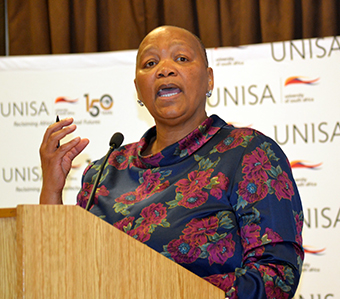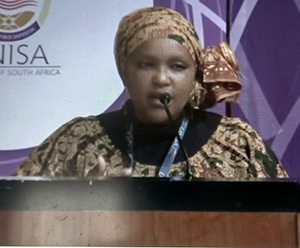News & Events
Embracing knowledge systems in the higher education space
Themed Pursuing excellence in performance, the Unisa Teaching, Learning, Community Engagement and Student Support (TLCESS) Portfolio held its Teaching and Learning Summit on 6 September 2023, aimed at fostering a clearer understanding of its strategic priorities, a comprehensive action plan, and a shared commitment to driving positive change within the portfolio and in the university. The summit was attended by, among others, heads of Unisa colleges, and attendees were given the opportunity to share their strengths, weaknesses, opportunities and threats. The event, therefore, provided a valuable platform for meaningful dialogue, collaboration, and the identification of concrete steps to enhance the performance of the portfolio’s targets.

Prof Zethu Nkosi
In her opening remarks, Professor Zethu Nkosi, Executive Dean of the College of Human Sciences, remarked that the indicators that guided Unisa regarding whether it is on the right track as an institution of higher learning include student success through pass rates, student retention through low dropout rates, as well as student graduateness through employability of the university’s alumni in professional work environment. She stated: “This event plays a pivotal role in shaping the future of the TLCESS Portfolio towards excellence in performance as we track its performance plans and its annual performance targets.”
Advancing digitisation and ethics in academia
Sharing the portfolio’s strategic overview and highlights, Professor Zodwa Motsa Madikane, Vice-Principal: TLCESS, described her portfolio as a knowledge generator. Motsa Madikane reiterated the importance of generating knowledge through research and disseminating it through publications and teaching material. She said: “We, therefore, must have a dialogue among each other regarding the knowledge that we generate as it is crucial to South Africa and beyond.”

Prof Zodwa Motsa Madikane
Motsa Madikane also highlighted that it was important for Unisa to embrace the Fourth Industrial Revolution as the institution trains intellectuals for the future. However, she also acknowledged that higher education institutions must consider human-focused implications as they generate knowledge. “No science can sustain itself without human beings,” she said. “However,” Motsa Madikane continued, “as we talk about digital transformation, digital literacy and academic literacy, excellence in our research and in our niche areas, which are largely on the scientific side, require us to also think about the skills of the future of the 21st and 22nd centuries.” She further maintained that the portfolio must consider digital inclusion as a means of communication and to diminish digital divide.
According to Motsa Madikane, ethics is one of the paramount attributes required to form and sustain any department or portfolio. She remarked: “Without ethics, our knowledge, qualifications, and new ideas will be insignificant. So, it is important for us to be ethical scholars, researchers and teachers.” In addition, she continued that other attributes include critical thinking, problem solving, reasoning and communication. “Regarding communication, if you cannot communicate properly, your idea will not be received well and will not be impactful. Also, communication should not be attacking and devaluing, considering that it is directed to a fellow human being,” she maintained.
Motsa Madikane explained that the portfolio was guided by high quality assurance systems that protected the university’s reputation on the public sphere. She added: “The portfolio is also driven by ideas – we are free to share new ideas and restructure old ones.” For her, human beings also drive her portfolio, and they must be taken care of as considering them would also assist in addressing various matters such as staff burnout.
Preserving identity in teaching and learning
“As a portfolio, we also pride ourselves as the African university in the service of humanity,” she noted. Motsa Madikane also urged colleges that as they proceed with excellence, they should not erase other knowledge systems, but should ensure that the African knowledge system also has a home in the portfolio, in decolonising the curriculum, and in the Africanisation of the education system. She asserted: “All knowledge systems that inform our practice must be presented, critiqued and studied.”
Motsa Madikane stated that the portfolio was tasked by the Principal and Vice-Chancellor, Professor Puleng LenkaBula, to transform epistemology. She said that it was also tasked by Council to implement the language policy, which was also required by the Department of Higher Education, Science and Innovation. “These projects will alleviate student failure rates as it was found that some students struggle to interface with our academic work due to language difficulty,” she explained. “Hence Council decided on a multilingual approach in our teaching,” she added. “Therefore,” Motsa Madikane concluded, “universities should sustain their identities.”
#Unisa150
* By Nancy Legodi, Acting Senior Journalist, Department of Institutional Advancement
Publish date: 2023/09/07
